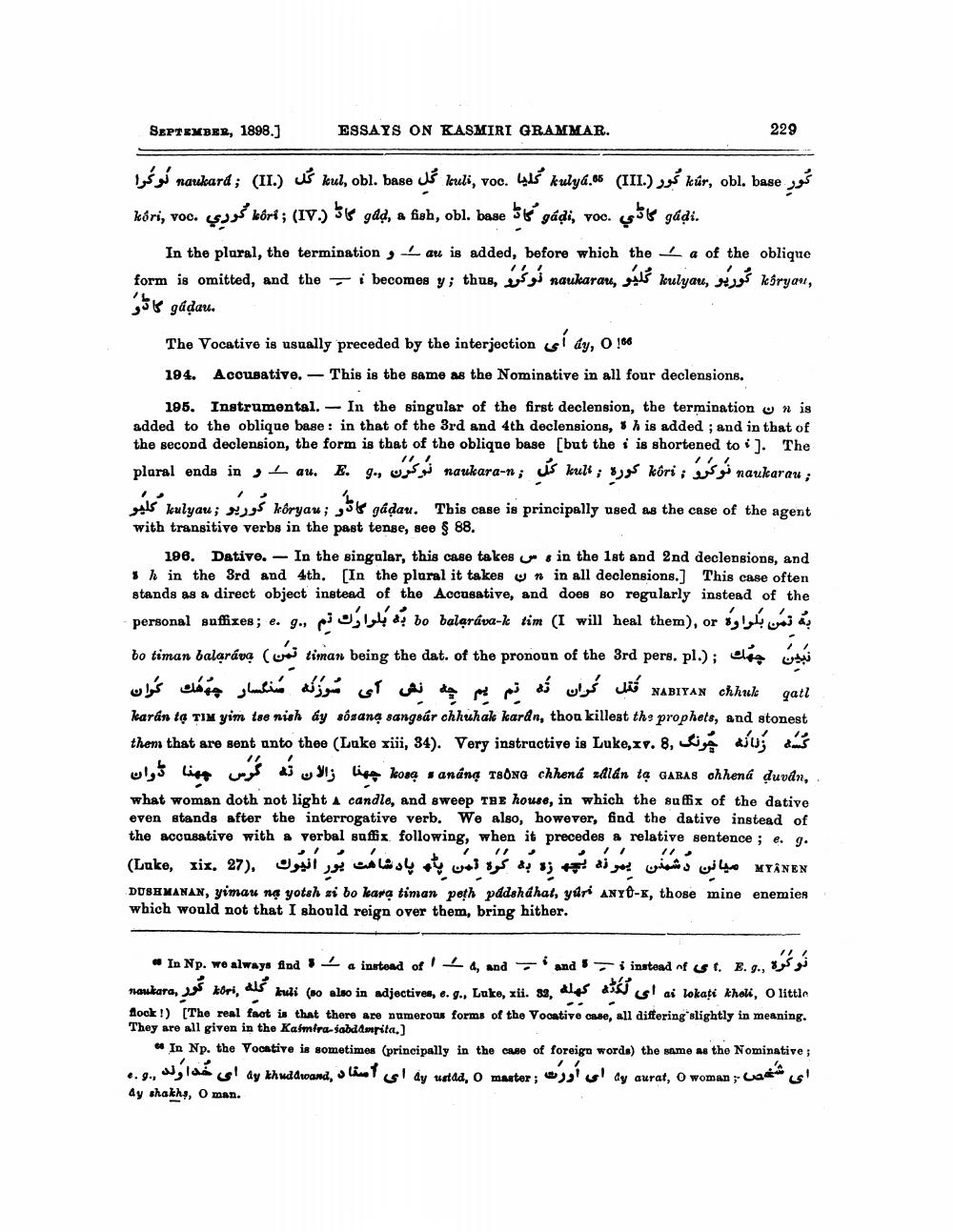________________
SEPTEMBER, 1898.)
ESSAYS ON KASMIRI GRAMMAR.
229
bus naukard ; (II.) u kul, obl. base us buli, voc. 45 kuly6.95 (III.) eskür, obl. base vous kóri, voc. vşyyskôré ; (IV.) 55 gâà, a fish, obl. base 5s gáại, voc. x 55 gâời.
In the plural, the termination , au is added, before which the <a of the oblique form is omitted, and the = i becomes y; thus, essi naukararı, júlts kulyau, visos kóryau, 955 gadau.
The Vocative is usually preceded by the interjection si dy, 0166 194. Acousative. - This is the same as the Nominative in all four declensions.
195. Instrumental. - In the singular of the first declension, the termination u nis added to the oblique base : in that of the 3rd and 4th declensions, % ) is added ; and in that of the second declension, the form is that of the oblique base [but the i is shortened to i]. The
و plaral and
in au. B
نوکرن .9 . ;nauharaw نوکرو : kori کوره ; kali كل ;nauhara-n
ols kulyau; S kôryau; ,345 gadau. This case is principally used as the case of the agent with transitive verbs in the past tense, see $ 88.
196. Dative. - In the singolar, this case takes u s in the 1st and 2nd declensions, and h in the 3rd and 4th. [In the plural it takes w in all declensions.] This case often stands as a direct object instead of the Accusative, and does bo regularly instead of the personal suffixes; e. g., pielbedo bo balaráva-k tim (I will heal them), org! bo timan balaráva (ww timan being the dat. of the pronoun of the 3rd pers. pl.); elés web
نه نمن ؟
گران
وزنه سنگسار چه
ای
کران ته تم يم چه نه gate قتل
NABITAN chhal
نا دوان
karán tạ Tim yim tse nish ay sósana sangsár chhuhak karán, thou killest the prophets, and stonest them that are sent anto thee (Luke xiii, 34). Very instractive is Luke,. 8, Liga al des
dj w ; lice kosa sanang taong chhená zdlån ta GaraS chhená duvân, what woman doth not light a candle, and sweep Toe house, in which the suffix of the dative even stands after the interrogative verb. We also, however, find the dative instead of the accusative with a verbal suffix following, when it precedes a relative sentence ; e. g. (Luke, xix. 27), Soul, DUSHMANAN, vimau na yotsh si bo kara timan peth pddshdhat, yuri ANYO-x, those mine enemies which would not that I should reign over them, bring hither.
دشمنن بمونه بچه زا به کره نمن پاه
XYANER میان
کله ههE کور ,Lankara
و
ا
In Np. wo always find a instead of < 4, and = i and = i instead of US C. E. 9., Xos gi
us kuli (so also in adjectives, 6.9., Lake, xii. 82, les distus ai lokati kheli, o little tock !) [The real faot is that there are numerous forms of the Vocative case, all differing slightly in meaning. They are all given in the Karmira-sabdAmpita.)
" In Np. the Vocative is sometimes (principally in the case of foreign words) the same as the Nominative;
..,
la
col ay khuddwand, olänt col dy veted, O master; w'ss' col ay aurat, О woman ;. cloaca si
ay shakhs, O man.




